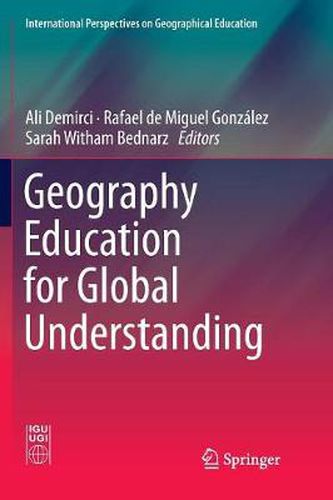Readings Newsletter
Become a Readings Member to make your shopping experience even easier.
Sign in or sign up for free!
You’re not far away from qualifying for FREE standard shipping within Australia
You’ve qualified for FREE standard shipping within Australia
The cart is loading…






This title is printed to order. This book may have been self-published. If so, we cannot guarantee the quality of the content. In the main most books will have gone through the editing process however some may not. We therefore suggest that you be aware of this before ordering this book. If in doubt check either the author or publisher’s details as we are unable to accept any returns unless they are faulty. Please contact us if you have any questions.
This book presents the core concepts of geographical education as a means of understanding global issues from a spatial perspective. It treats education, supported by high standards, approaches, methodologies, and resources, as essential in exploring the interactions of the world’s human and environmental systems at local, regional, and global scales embedded in the nature of the discipline of geography. It covers topics such as climate change, sustainable development goals, geopolitics in an uncertain world, global crisis, and population flows, which are of great interest to geography researchers and social sciences educators who want to explore the complexity of contemporary societies.
Highly respected scholars in geography education answer questions on key topics and explain how global understanding is considered in K-12 education in significant countries around the globe. The book discusses factors such as the Internet, social media, virtual globes and other technological developments that provide insights into and visualization - in real time - of the intensity of relationships between different countries and regions of the earth. It also examines how this does not always lead to empathy with other political, cultural, social and religious values: terrorism threats and armed conflicts are also essential features of the global world. This book opens the dialogue for global understanding as a great opportunity for teachers, educators, scholars and policy makers to better equip students and future citizens to deal with global issues.
$9.00 standard shipping within Australia
FREE standard shipping within Australia for orders over $100.00
Express & International shipping calculated at checkout
This title is printed to order. This book may have been self-published. If so, we cannot guarantee the quality of the content. In the main most books will have gone through the editing process however some may not. We therefore suggest that you be aware of this before ordering this book. If in doubt check either the author or publisher’s details as we are unable to accept any returns unless they are faulty. Please contact us if you have any questions.
This book presents the core concepts of geographical education as a means of understanding global issues from a spatial perspective. It treats education, supported by high standards, approaches, methodologies, and resources, as essential in exploring the interactions of the world’s human and environmental systems at local, regional, and global scales embedded in the nature of the discipline of geography. It covers topics such as climate change, sustainable development goals, geopolitics in an uncertain world, global crisis, and population flows, which are of great interest to geography researchers and social sciences educators who want to explore the complexity of contemporary societies.
Highly respected scholars in geography education answer questions on key topics and explain how global understanding is considered in K-12 education in significant countries around the globe. The book discusses factors such as the Internet, social media, virtual globes and other technological developments that provide insights into and visualization - in real time - of the intensity of relationships between different countries and regions of the earth. It also examines how this does not always lead to empathy with other political, cultural, social and religious values: terrorism threats and armed conflicts are also essential features of the global world. This book opens the dialogue for global understanding as a great opportunity for teachers, educators, scholars and policy makers to better equip students and future citizens to deal with global issues.